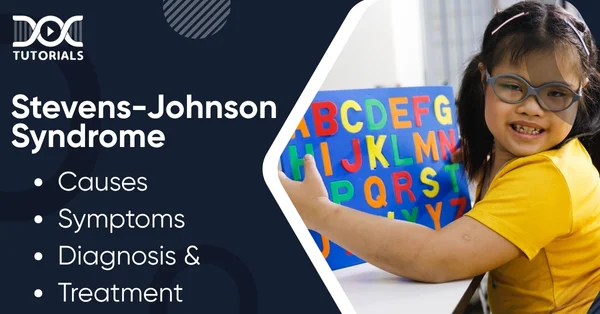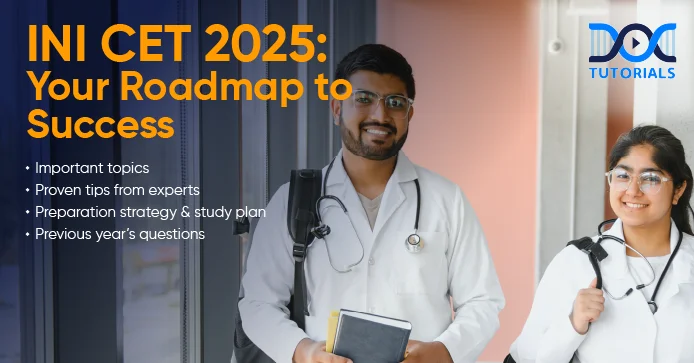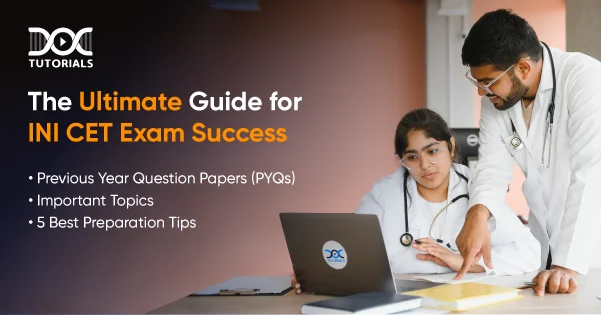Stevens-Johnson Syndrome: Causes, Symptoms, Diagnosis, and Treatment

Certain medications or infections may lead to allergic reactions on your skin, such as Stevens-Johnson Syndrome. This is a skin-peeling condition that requires hospitalisation to detect the medicines causing such a reaction. The treatment starts by stopping the reactive drugs, followed by skin dressings, replacing electrolytes, and other procedures.
NEET PG aspirants must have a detailed understanding of Stevens-Johnson syndrome since it is a vital topic of their syllabus. To learn more about this syndrome, its causes, symptoms, diagnosis, and treatment options, continue reading till the end!
What is Stevens-Johnson Syndrome?
Stevens-Johnson syndrome, or SJS, is a severe skin condition in which blisters and rashes develop on the affected individual’s skin, leading to skin peeling. Here is a brief overview:
- This syndrome mainly affects one’s mouth, eyes, genitalia, and other mucus membranes.
- SJS is often considered similar to TEN (toxic epidermal necrolysis), another serious skin condition that differs from SJS in terms of severity.
- TEN is a more intense condition in which more than 30% of an individual’s skin is prone to peeling.
- However, both SJS and TEN bring potential threats to life, so the patient must be admitted to the hospital.
What are the Causes of Stevens-Johnson Syndrome?
The actual cause of Stevens Johnson syndrome is still unknown to doctors. However, this rare syndrome is often triggered by infection, certain medicines or both. Reaction to a medication may even occur after you have stopped after using it for at least 2 weeks.
Some of the drugs that cause Stevens-Johnson syndrome are listed below:
- Antipsychotics and anticonvulsants (medicines for treating mental issues and seizures)
- Allopurinol or other anti-gout medicines
- Sulfasalazine and other antibacterial sulfonamides
- Ibuprofen (Motrin IB, Advil, etc.), Acetaminophen (Tylenol), Naproxen Sodium (Aleve) and other pain relievers.
- Viramune XR, Viramune, and other Nevirapine
- HIV and pneumonia infection can also lead to Stevens-Johnson syndrome
What are the Risk Factors of Stevens-Johnson Syndrome?
Here are some of the people who face a higher risk of Stevens-Johnson syndrome:
- Individuals with weak immunity
- Those who are undergoing chemotherapy
- Individuals who have taken specific drugs and experienced certain symptoms
- People having HIV or AIDS
- Family history of Stevens-Johnson syndrome
What are the Symptoms of Stevens-Johnson Syndrome?
Here are some of the common Stevens-Johnson syndrome symptoms:
- Headache
- Arthralgia
- Coughing up a viscous, purulent sputum
- Malaise
Patients often report a burning rash that appears symmetrically on the face and upper chest. Here are some of the symptoms that may occur:
- The skin rash typically starts as flat spots (macules) and can progress to raised bumps (papules), blisters (vesicles), larger fluid-filled sacs (bullae), hives-like plaques, or widespread redness.
- A classic sign is the “target” lesion, which is highly characteristic and helps diagnose.
- Unlike erythema multiforme, these target lesions display only two distinct colour zones.
- The central area of the lesion may be filled with fluid (vesicular), contain blood (purpuric), or show tissue death (necrotic), and is surrounded by a flat area of redness.
- Over time, some lesions may develop into large blisters that can burst, resulting in exposed, raw skin.
- This denuded skin is particularly vulnerable to secondary infections, making prompt recognition and management crucial.
How to Diagnose Stevens-Johnson Syndrome?
Diagnosing Steven Johnson syndrome begins with a thorough medical history review, focusing on recent or current medications, and a detailed physical examination to assess symptoms. They may include:
- Biopsy
A skin biopsy is often performed, where a small piece of affected skin is removed and examined in the lab. This helps confirm the diagnosis and exclude other skin conditions.
- Blood Tests
It helps detect infections or rule out other underlying causes that contribute to your symptoms.
- Culture
Your healthcare provider may take skin, tissue, or fluid samples for laboratory cultures to check for possible infections.
- Imaging Test
Depending on your symptoms, imaging tests such as a chest X-ray might be recommended, especially to look for complications like pneumonia.
Together, these tests help healthcare professionals accurately diagnose SJS and guide appropriate treatment, ensuring other possible conditions are not overlooked.
What are the Treatment Options for Stevens-Johnson Syndrome?
Stevens-Johnson syndrome is a serious condition that requires hospital care, often in an intensive care unit. Here is a detailed overview:
- Treatment focuses on stabilising the patient and managing symptoms. Intravenous fluids are given to prevent dehydration due to skin loss.
- The affected skin is carefully treated with cold compresses, soothing creams, and protective bandages to reduce pain, inflammation, and the risk of infection.
- Amniotic membranes or specific wound dressings may be used in extreme situations.
- Early in the illness, intravenous immunoglobulin (IVIG) or high-dose steroids may be administered to limit disease progression.
- Eye care is crucial, starting with artificial tears and ointments to keep the eyes moist.
- For significant redness or inflammation, steroid drops are prescribed, while antibiotics and ointments are added if ulcers are present.
- In advanced cases, after the acute phase, procedures such as corneal transplantation or limbal stem cell transplantation may be considered based on an ophthalmologist’s advice.
FAQs About Stevens-Johnson Syndrome
- How long does it take to recover from Stevens-Johnson syndrome?
Your skin should start healing within 2–3 weeks if there’s no infection, but full recovery may take months. You must permanently avoid the medication that caused your Stevens-Johnson syndrome.
- How to prevent Stevens-Johnson syndrome?
It’s often impossible to predict how you’ll react to medications. If you’re of Asian descent, consider genetic testing before taking carbamazepine. Also, if you’ve had SJS, always inform healthcare providers, wear a medical alert bracelet, and avoid the triggering medication.
- What are the complications of Stevens-Johnson syndrome?
Stevens-Johnson syndrome may lead to severe complications, including skin infections, scarring and colour changes, organ damage (lungs, liver, kidneys), long-term eye issues, and genital scarring affecting function.
- Can vaccines cause Stevens-Johnson syndrome?
Though Stevens-Johnson syndrome after vaccination is very rare, it has been reported. Still, the overall benefits and protection provided by vaccines far outweigh these uncommon risks.
- Does Stevens-Johnson syndrome have long-term effects?
Long-term effects of Stevens-Johnson syndrome may include lasting scars, ongoing pain, and vision issues, depending on how severe the episode was and which parts of the body were involved.
Conclusion
Stevens-Johnson syndrome needs immediate medical attention to get the affected person back to normal life. Avoiding the treatment can lead to severe complications like eye issues, respiratory diseases, sepsis, etc.
Medical professionals or those preparing for the NEET PG exam must learn topics like Stevens-Johnson syndrome to cover their syllabus. For detailed study-related information, you can join DocTutorials. Our concise video lectures, faculty-reviewed question banks, and the convenience of e-learning enable a smooth preparation for your exams. Join our NEET PG courses for complete guidance!
Latest Blogs
-

NEET PG Exam 2025- Date, Pattern, Marking Scheme, Subject Wise Weightage, and Exam Mode
NEET PG Exam 2025 is the ultimate gateway for medical graduates aspiring to pursue postgraduate courses in medicine, including MD,…
-

INI CET Exam 2025: Your Roadmap to Success – Key Topics, Strategies, and Lessons from Last Year’s Papers
The INI CET exam is more than just a test; it’s a significant milestone for many medical students aiming to…
-

INI CET Exam Success: Previous Year Question Papers & Ultimate Guide – INI CET PYQ
One can feel overwhelmed while preparing for the INI CET (Institute of National Importance Combined Entrance Test). A vast syllabus,…




